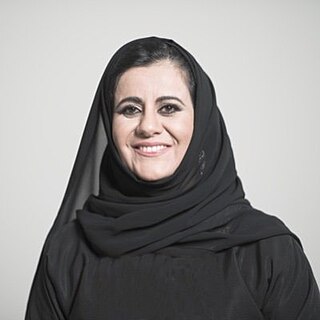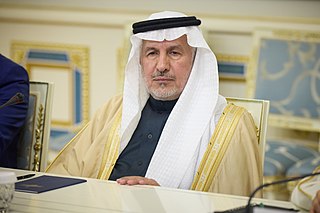Related Research Articles

The Presidential Advisory Council on HIV/AIDS (PACHA) advises the White House and the Secretary of Health and Human Services on the US government's response to the AIDS epidemic. The commission was formed by President Bill Clinton in 1995 and each president since has renewed the council's charter.
Abdulaziz bin Ahmed Al Saud is a Saudi royal, grandson of King Abdulaziz, and businessman.

Selwa Al-Hazzaa is a Saudi ophthalmologist and head of the ophthalmology department at King Faisal Specialist Hospital. She served as the personal ophthalmologist for the late King Fahd bin Abdulaziz Al Saud. She is one of the first Saudi women to achieve international success academically and professionally. On January 11, 2013, per a Royal Decree from King Abdullah, Al-Hazzaa became one of the first ever female members of the Saudi Arabia Shoura Council.

Abdullah bin Abdulaziz Al Rabeeah is a Saudi pediatric surgeon. He has filled a number of supervisory and advisory roles in Saudi Arabia, including Minister of Health, Advisor to the Royal Court, and Supervisor General of the international aid agency KSrelief.

The National & Gulf Center for Evidence Based Health Practice has been established with the initiative of Bandar Al Knawy, Chief Executive Officer of National Guard Health Affairs, and with the support of former chief executive, Abdullah bin Abdulaziz Al Rabiah in March 2004. The center is recognized by the Cooperation Council for the Arab States of the Gulf Ministers of Health as a reference to evidence-based medicine (EBM) in Saudi Arabia and the Cooperation Council for the Arab States of the Gulf (GCC). The center is an affiliated center to Evidence Based Clinical Practice Group in McMaster University, Canada. This group is led by Gordon Guyatt. It is also a collaborating centre to The Joanna Briggs Institute for Evidence Based Health care, in the University of Adelaide, Australia. The center works in contact, coordination and collaboration with the National EBM committee, GCC Ministers of Health Executive Office, Arabian Gulf University EBM Center, Bahrain, University of Sharjah EBM center, United Arab Emirates, and Sultan Qaboos University EBM Center, Oman.

The College of Medicine in King Saud University was established as the first medical college in the Kingdom in 1967. One year later, King Abdul-Aziz University Hospital, became affiliated with the college and subsequently in 1981, King Khalid University Hospital and the new college building were established to become the main teaching campus and patient service facility. To date, the college has graduated more than 4000 undergraduate students, 200 postgraduates students, and more than 700 graduates from different medical specialties fellowship programs.

Since 2012, an outbreak of Middle East respiratory syndrome coronavirus has affected several countries, primarily in its namesake, the Middle East. The virus, which causes Middle East respiratory syndrome (MERS), is a novel coronavirus that was first identified in a patient from Jeddah, Saudi Arabia on 6 June 2012.

George Rainer Siber is a Canadian-American medical researcher and vaccinologist.
The International Society for Infectious Diseases (ISID), established in 1986, is a nonprofit organization that monitors infectious diseases on a global scale. It also offers grants and fellowships, publishes a journal, and runs online learning platforms for sharing information on managing infectious diseases. It is based in Brookline, Massachusetts, US. The organization solicits donations from the general public, as well as governments, foundations, and the pharmaceutical industry.
Yasmin Ahmed Almubarak Altwaijri is a Senior Scientist and the Head of Epidemiology Research at King Faisal Specialist Hospital and Research Centre (KFSH&RC) in Riyadh, Saudi Arabia. As the Head of Epidemiology Research, she studies the causes and effects of diseases and illnesses within a specific country, in her case Saudi Arabia. She studies the prevalence of conditions such as obesity and mental illness in Saudi society, and is active in advocating for social and political changes to promote better health.
Barbara J. Stoll is an American pediatrician and professor. She is the H. Wayne Hightower Distinguished Professor in the Medical Sciences, Professor of Pediatrics and former Dean at McGovern Medical School.

Helen Boucher is an American physician and infectiologist who is the dean of the Tufts University School of Medicine and the Chief Academic Officer of Tufts Medicine, the parent health system for Tufts Medical Center in Boston. She is the first woman to serve as the dean of the Tufts University School of Medicine.
Allison Joan McGeer is a Canadian infectious disease specialist in the Sinai Health System, and a professor in the Department of Laboratory Medicine and Pathobiology at the University of Toronto. She also appointed at the Dalla Lana School of Public Health and a Senior Clinician Scientist at the Lunenfeld-Tanenbaum Research Institute, and is a partner of the National Collaborating Centre for Infectious Diseases. McGeer has led investigations into the severe acute respiratory syndrome outbreak in Toronto and worked alongside Donald Low. During the COVID-19 pandemic, McGeer has studied how SARS-CoV-2 survives in the air and has served on several provincial committees advising aspects of the Government of Ontario's pandemic response.

Sallie Robey Permar is the pediatrician-in-chief at NewYork-Presbyterian / Weill Cornell Medical Center and the chair of the Department of Pediatrics at Weill Cornell Medicine. Her research focuses on infections affecting newborns.
Catherine Wilfert was an American pediatrician specializing in infectious diseases. She became a professor at Duke University School of Medicine and known internationally for her work in pediatric HIV prevention. After 1993, using zidovudine during pregnancy led to an estimated reduction of mother-to-infant transmission of HIV in the United States by 75 percent and a 47 percent decrease in new HIV infections globally.
Hanan Abdulrahim Al-Ahmadi is a Saudi Arabian academic who has been a member of the Consultative Assembly of Saudi Arabia since 2013 and Assistant Speaker since October 2020. She is the first woman to hold the position and in December 2020 became the first woman to chair a session of the body.

Jameela Al Salman is a Bahraini physician, infectious disease specialist, and associate professor at the Arabian Gulf University. She has won several awards and honors for her contributions to the field of medicine. Al Salman holds three American Board certifications: the American Board of Internal Medicine, the American Board of Geriatric Medicine, and the American Board of Infectious Diseases.
Ann Marie Kimball is an American physician. She is known for being the pioneer of electronic disease surveillance for infectious disease outbreaks and pandemics. She is currently a Professor Emerita in the Department of Epidemiology at the University of Washington, a Consulting Fellow at the Chatham House Royal Institute of Foreign Affairs, and was a Strategic Consultant in Global Health at the Rockefeller Foundation. Kimball served as a technical and strategic lead for the Bill and Melinda Gates Foundation infectious disease surveillance strategy formation.
Sulafa Khalid Mohamed Ali is a pioneer in paediatric cardiology in Sudan.

Alexander Woodman is a professor of clinical preventive medicine and public health who has been widely recognized for his research work in the Middle East and North Africa (MENA) region. His primary research focuses on advancing global reproductive health, medical education, clinical research methodologies, and health diplomacy.
References
- 1 2 "WHO EMRO | Regional director | About WHO" . Retrieved 2024-12-30.
- ↑ "TheFace: Hanan Balkhy, professor of pediatrics and infectious diseases". Arab News. 22 November 2018. Retrieved 27 February 2021.